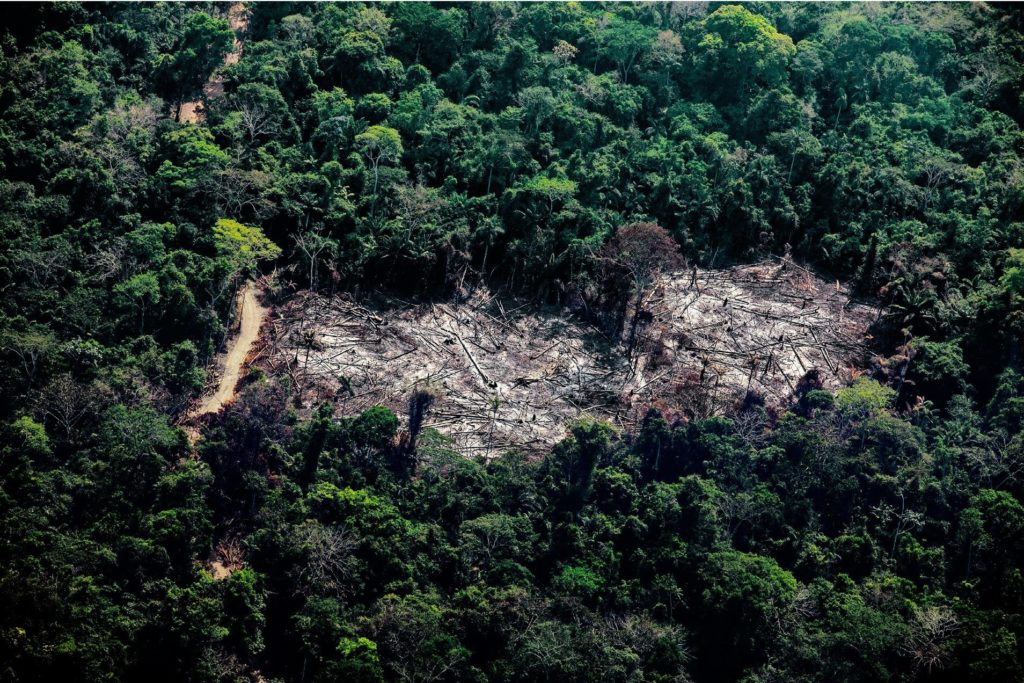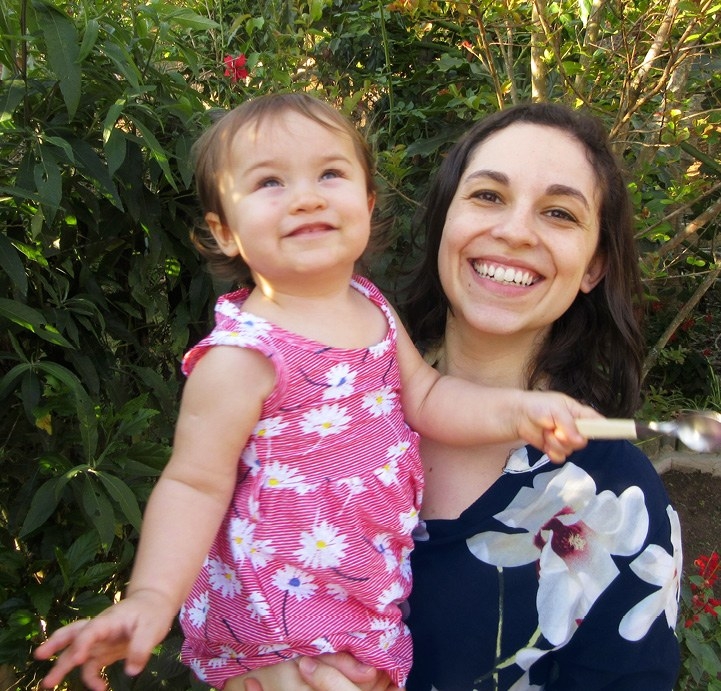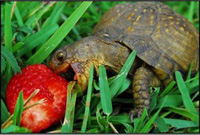
Vogue | Up Front
Jan. 2020
by Vanessa Barbara
IT WAS A MONDAY AFTERNOON when day turned into night in the city of São Paulo. I was visiting an expensive nursery school for my 13-month-old daughter, trying to look remotely worthy of such a sophisticated institution. Although it was not supposed to rain that day, the sky suddenly disappeared behind a dense layer of low, heavy clouds. A two-year-old boy stepped out of his classroom, rubbed his eyes, and looked inquisitively at the principal, who said, “No, it isn’t night yet, dear, and your father’s not here to pick you up. Go back inside.”
Later that day, meteorologists struggled to explain the midday darkness. They eventually blamed low-lying clouds from a cold front combined with smoke from the fires in the Amazon rain forest, thousands of miles away. Many people saw this as a sign. While we Brazilians were carrying out our day-to-day activities in oblivion, our rain forest was sending an unequivocal distress signal. How were we going to answer? Was there anything we could do besides posting angry rants on social media?
In August, Brazil’s National Institute for Space Research reported an 84% increase in fires in the country compared with the same period in 2018. More than half of these were in the Amazon region. Thanks to images from NASA and NOAA satellites, one can see the extent of the devastation: dozens of smoldering patches of land clouding the otherwise dark-green landscape. The smoke from the flames had already swept across several Brazilian states, including São Paulo.
These were not natural wildfires—nor caused by weather and other factors, like the recent, devastating blazes in California. They were likely set by cattle ranchers, farmers, and loggers to clear the land for commercial purposes. Their method is well known: First they pull trees by their roots, using tractors equipped with chains. They wait a few months for the dry season, and when the piles of wood have finally dried, they set fire to everything.
It’s been going on for decades. For a while, between 2004 and 2014, a stricter enforcement of environmental laws had effectively curbed the pace of deforestation. But over time, a coalition of landowners, soy producers, and other rural players—the so-called agribusiness caucus—has gained more and more power in Brazilian politics, pushing its economic interests further into the forest. Then came the election of far-right politician Jair Bolsonaro—a notorious anti-environmentalist who sneers at the rights of indigenous people—and all hell broke loose.
Landowners have felt emboldened by the new president’s rhetoric. Some of them even coordinated a recent “fire day” in the northern state of Pará to declare their right to burn land. Worse, several reports have described a gruesome uptick in attacks on indigenous territories since Bolsonaro won the presidency, with several cases of homicide, stoning, and arson. Last January, dozens of men armed with machetes, chainsaws, and firearms entered the protected territory of the Uru-eu-wau-wau tribe to claim land for commercial purposes. They marked trees and staked out plots for sale. For months the tribespeople have fought back. Now part of this territory is on fire.

SO THERE WE WERE in the streets of one of the world’s largest cities as the sky turned dark. Ironically, my husband and I were interested in that upscale nursery school mainly because it is one of only a few in the neighborhood with a large outdoor area, a place where children are not confined to a concrete room depressingly devoid of windows. In a dense city like this, where trees are such a luxury, it can be hard to believe there’s hope for the Amazon.
But I’ve long since learned that being Brazilian is an exercise in helplessness. Protesting in the streets, organizing strikes, or calling the United Nations to beg for international attention—it can all feel beside the point given the Brazilian government’s legendary ability to ignore its own people. Sometimes policies temporarily change—under the heat of media pressure, perhaps—only to worsen exponentially later, when the news cycle has moved on.
The feeling of helplessness is acute for someone like me, a writer and journalist who is constantly taking stock of her country. One of my columns for the New York Times, for instance, praised the United Nations’ special rapporteurs—independent experts who monitor countries on behalf of the international body. I’d learned about them through my work: Whenever I researched a serious Brazilian matter related to, say, the environment, or the rights of the indigenous people, I would find out there had been a stern, accurate statement from a special rapporteur condemning exactly this situation. And the statements were always ignored. “Let’s keep working together on being neglected,” I wrote at the end of my piece. And I meant it.
But helplessness is no way to live, or else why would I have chosen to have a child? There is something endearingly foolish about a couple deciding to bring a new life into this world, I think. And things were not good when I decided to take the leap of faith: President Dilma Rousseff had been recently impeached on controversial charges of manipulating the federal budget. The incumbent government was enjoying an approval rating of 3%—almost lower than the poll’s margin of error. And yet I decided to go for it. I mean, the future had to be brighter, right? Little did I know that I would be nursing my tiny baby when the unimaginable happened: Jair Bolsonaro elected the 38th president of Brazil. The retired military man who praised the country’s history of dictatorship and who disparaged women, blacks, and homosexuals. The same man who vowed to put an end to all activism in Brazil. Indeed things could get worse. At home, watching the returns come in, I cried so much that my daughter stopped nursing to look up at me. She was wearing a rainbow onesie that day.
The grim new reality gave fresh resonance to another leap of faith I’d taken some years before. This was at another moment of powerlessness—personal and professional—and I’d first considered such remedies as studying medicine, opening a turtle sanctuary, or joining one of the remarkable environmental NGOs that work in Brazil. Feeling unsuited for any of it, I settled instead on one of the few true freedoms that we have: the choice of what to eat. I became a vegetarian.
At first I was guided only by ethical reasons: Animals are sentient beings that feel pain and are due certain moral rights. Killing a living creature seemed to me justified only in extreme circumstances; consuming an animal just for your own pleasure, convenience, or out of habit was morally wrong. I felt strongly about this, but I knew it would be difficult—for a number of reasons—to stop eating meat. I hate to cook; there are very few vegetarian restaurants in this city that open for dinner. I’ve had anemia before; I struggle with chronic depression. None of it would be easy, I complained to a vegan friend. (Until then, the only thing we had in common was our commitment to amateur astronomy.)
He just replied, “You are seeing this from the wrong point of view.” When we moan about difficulty, what we really mean is we’re not willing to stand up for fundamental change. Try talking about difficulty to a cow waiting in the line to get a captive bolt in her skull. Try talking about difficulty to indigenous tribes being exterminated to make room for livestock. Would I resign myself to helplessness? How serious was my indignation? I decided to get my act together; I consulted a nutritionist and stopped eating meat on the same day.
THE FACT THAT most Brazilians don’t think, even for a moment, about vegetarianism— that we are one of the world’s most carnivorous countries—spurred me along in my defiance. The case for eating meat is conservative, as conservative as the people who voted for Bolsonaro. They’d argue that meat-eating is natural, normal, and even necessary.
They’d appeal to tradition, evoke images of Christmas turkeys roasting in wealthy suburban homes. According to their worldview, vegetarians are outsiders, along with homosexuals, feminists, atheists, environmentalists, indigenous people, blacks, and immigrants—the same groups that Bolsonaro once swore to eradicate. Such an honor, I thought.
Gradually my choice became more about politics—and about the climate. These facts are fairly well known: Going vegetarian is one of the four biggest environmental contributions a single person can make—along with having one fewer child, living car-free, and avoiding air travel (especially transatlantic flights). The livestock sector is horribly inefficient, representing nearly 15% of global greenhouse gas emissions, while providing just 18% of calories and a third of the protein consumed around the world. In 2010, the U.N. reported that a significant reduction of the impact from greenhouse gases could be possible only with “a substantial worldwide diet change, away from animal products.” And in October 2018, a report in Nature argued that a shift toward plant-based diets was essential to mitigate the effect of greenhouse gases. According to the research, citizens from rich nations such as the United States would need to cut beef consumption by 90%.
And, of course, Brazil is the world’s largest exporter of beef and the second-largest soy producer. (Around 70% of the world’s soybean ends up as feed for animals—not for direct human consumption.) Livestock production is by far the leading cause of deforestation in the Amazon. According to a 2004 report from the World Bank, medium- and large-scale cattle ranching accounts for 80% of all converted land in the forest. Which is probably why President Bolsonaro recently declared that environmental issues matter only to “vegans, who eat only vegetables.” He was speaking for the status quo.
In the end, we didn’t choose the upscale school for our daughter—and not only because it was too expensive. I feared she would grow up among rich, entitled children of the same conventional families, and she would lack a diversity of perspective. We decided to hang around a few more months on the waiting list for the public nursery schools, which are unpretentious but have very nice teachers. I supposed she would be more comfortable there, with her rainbow onesie and her feminist toys. (She has a knitted Molotov cocktail, which we often throw at the chauvinist Easter Bunny. She also wears a secondhand onesie that says prince, which my neighbors find outrageous.)
I have to admit I feared the conversations I would have with the other parents in that upscale school. Already I catch myself dodging small talk in order to hide the fact that I’m a vegetarian; I’ve also learned to make excuses to skip barbecues or feijoadas, serving a traditional Brazilian dish made with black beans and pork. I mostly try not to sound judgmental, since I feel that people here can see my dietary choices as a threat to their way of life. After all, everyone knows that a woman should cook, obey her husband, and honor the Lord by diligently consuming His creatures. If I refuse to follow these rules, there must be something wrong with me. Maybe I’m secretly trying to boycott the Brazilian meat industry. Maybe I’m not patriotic. Maybe this will become one of the many subversive acts that call for punishment.
I am equally aware that the efforts of a single person are barely a scratch in the grand scheme of things. A vegetarian mother does not create a greener, compassionate world for her child (and my daughter is eating meat . . . for now. I’ll let her decide for herself when she’s older). I’ve never been the one to make decisions by weighing their consequences, for better or worse, so in a way it doesn’t matter if my vegetarianism has any effect on whether Brazilians continue to raise and kill animals for food. Brazil may indeed become a country with no place for indigenous people, homosexuals, blacks, feminists, environmentalists, and vegetarians. The fires may persist, the smoke continuing to gather. But I will choose not to participate in that grim barbecue.

